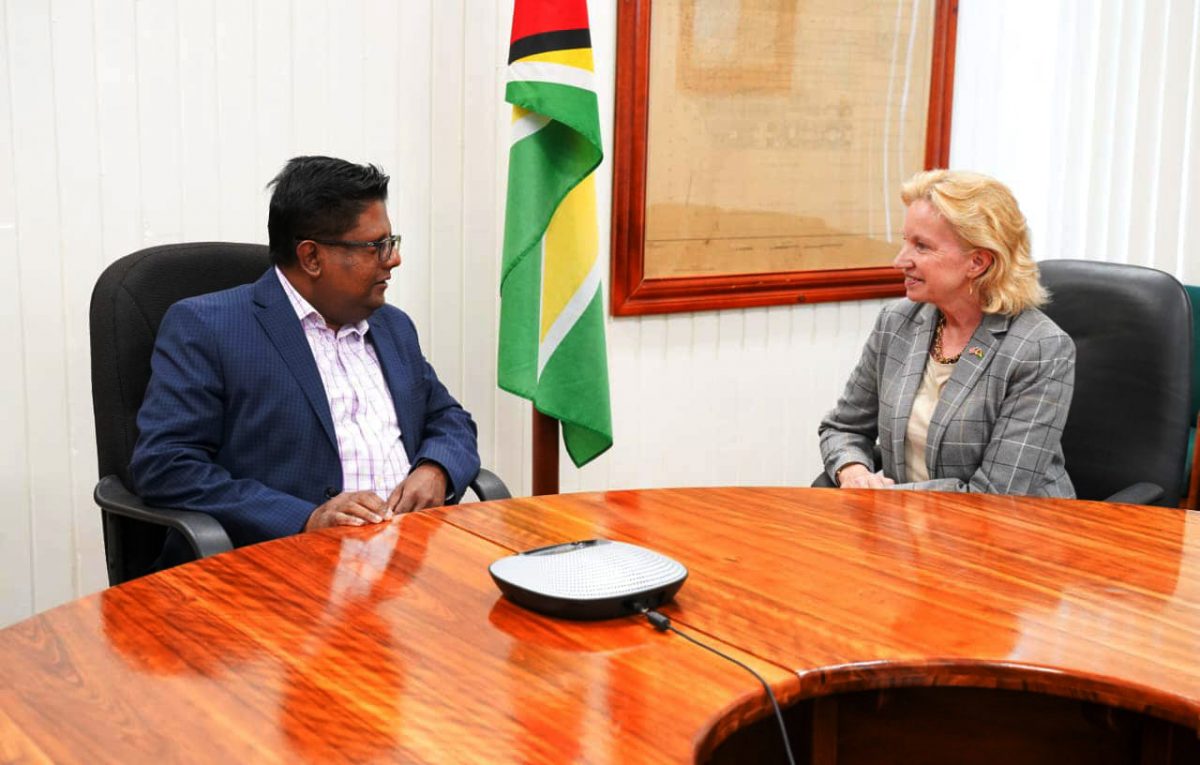Underscoring contract sanctity, outgoing United States Ambassador Sarah-Ann Lynch says that Washington does not insert itself into the negotiations involving its private sector and acts only as a facilitator tor ensure those companies know what investment options are available in foreign territories, and as such could not now do so regarding the controversial agreement between ExxonMobil and this country.
“We don’t get involved in the details of these contracts. We don’t certainly get involved in the details of any business. Our goal here is more one of matchmaking,” the Ambassador told Stabroek News in an exclusive interview.
In March of this year, the Ambassador had, in relation to the Exxon deal, emphasised contract sanctity. However, large numbers of Guyanese here and abroad feel that Guyana had been taken advantage of in this deal, as it had no oil and gas expert on its side when the 2016 agreement was signed.
The US envoy was asked if the US government has a responsibility to ensure that companies like Exxon do not exploit countries like Guyana and that, given one of the fundamentals of the American society is that everyone pays their fair share of taxes, and since ExxonMobil pays no taxes to this country, if that shouldn’t also be grounds for restructuring the 2016 PSA.
“When contracts are signed, that is a commercial matter between the company and the other signatory, in this case the Government of Guyana. But what we encourage all companies to do, US companies, is, do their due diligence, in working either with or when working with local partners here. We also encourage Guyanese companies to do the same. So at the end of the day though, what’s important, I think, for Guyana, is to observe the sanctity of contracts, because other investors are watching,” she said.
Continuing, Lynch posited, “Once the contract has been agreed to, it is important to observe that sanctity of the contract, so that future investors know that whatever they invest in they will get. Investors want to invest in safe places. They want a place that’s safe, secure, and predictable and so investors will want to know that once they sign a contract, it will be abided by. So that’s really the important story I think… I think here with contracts.”
Lynch had earlier this year lauded the Guyana Government for making the country attractive for investors and underlined the importance of contract sanctity while at the same time stressing the need for the improvement of the lives of all Guyanese. At a welcome reception for a delegation from the powerful US House of Representatives Ways and Means Committee at her residence, Lynch heaped praise on the government here for providing a welcoming investment climate. With President Irfaan Ali and a number of his Cabinet members present, she had said: “We applaud the Government of Guyana for the strides it has taken to make this country attractive to investors. They have been excellent partners in energy, agribusiness, and security. They are taking bold leaps to transform the financial, education, health, and tourism sectors. And, as you have seen, Representatives, in even your short time here, there are major infrastructure projects underway across the country, and the progress is constant. The government clearly wants to leverage the opportunities they are receiving, and the United States stands ready to assist.”
Amid unrelenting calls here for a renegotiation of the 2016 Production Sharing Agreement with US oil major, ExxonMobil, Lynch waded into the issue and congratulated both this government and its predecessor for recognizing contract sanctity. “Since first oil, Guyana’s political leaders have honoured contractual commitments and continue to do so. This signals the importance of the sanctity of contracts – which is foundational to any economy, and in particular Guyana, as it continues to transform at a record pace,” Lynch told the gathering which also included Leader of the Opposition, Aubrey Norton and members of the private sector.
Purely commercial
On the issue of ExxonMobil not paying taxes and the US ensuring the company pays its due, she told this newspaper that she didn’t “know enough about [the] tax laws here in Guyana to opine on that.” Nonetheless, she emphasized that the US sees Guyana as a great investment destination for its citizens and encourages them to forge partnerships here.
“So we’d like to connect US companies to the local environment here. What we do here in the US Embassy, Georgetown, is we tell companies about the political landscape here, the economic landscape, that commercial landscape. So we kind of, from our perch, we tell companies that this is the way they do things here. We do that through, as I mention, these webinars, calls, conferences, trade missions that we’ve brought here. You know, we try to get potential investors as many appointments as possible with those that we think would make sense for them to meet here. So our job is to kind of bring them together and then inform them as far as what we see as the landscape here,” she said. “And then any actual deal-making, the final deals we do not get involved. We step back and that’s a purely a commercial matter between the entities involved,” she added.






